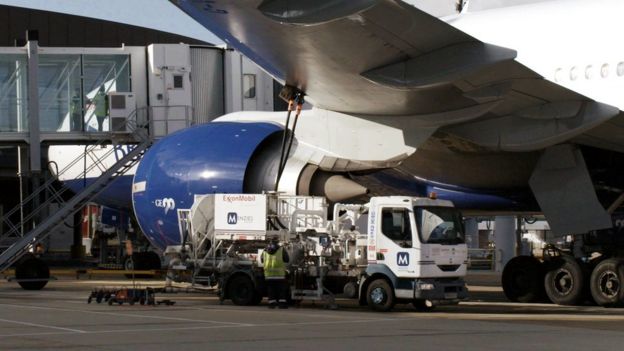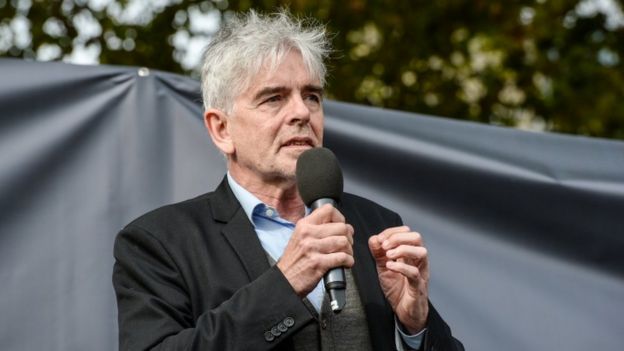A British Airways whistleblower has revealed an industry-wide practice that deliberately adds weight to flights, increasing greenhouse gas emissions.
"Fuel tankering" sees planes filled with extra fuel, usually to avoid paying higher prices for refuelling at their destination airports.
It could mean extra annual emissions equivalent to that of a large town.
BA said it was common to carry extra fuel for "operational, safety and price reasons".
BBC Panorama has discovered the airline's planes generated an extra 18,000 tonnes of carbon dioxide last year through fuel tankering.
Cost savings made on a single flight can be as small as just over £10 - though savings can run to hundreds of pounds.
Researchers have estimated that one in five of all European flights involve some element of fuel tankering.
The practice on European routes could result in additional annual greenhouse gas emissions equivalent to that produced by a town of 100,000 people.
 Critics say the widespread use of the practice undermines the aviation industry's claims that it is committed to reducing its carbon emissions.
John Sauven, Greenpeace UK's executive director, told the BBC this was a "classic example of a company putting profit before planet".
He added: "This is why we can't afford another decade of believing corporate greenwash and waiting for the voluntary carbon reductions to appear.
"We need tough regulations to limit aviation's emissions, because so long as there's money in polluting, they'll pollute as much as they can."
Critics say the widespread use of the practice undermines the aviation industry's claims that it is committed to reducing its carbon emissions.
John Sauven, Greenpeace UK's executive director, told the BBC this was a "classic example of a company putting profit before planet".
He added: "This is why we can't afford another decade of believing corporate greenwash and waiting for the voluntary carbon reductions to appear.
"We need tough regulations to limit aviation's emissions, because so long as there's money in polluting, they'll pollute as much as they can."
 Image copyrightGETTY IMAGES
Image captionJohn Sauven called for rules and regulations to be "tougher"
International Airlines Group (IAG), the company that owns BA, says it wants to be the world's leading airline group on sustainability.
BA boasts it even prints its in-flight magazine on lighter paper to save weight.
Yet BBC Panorama has seen dozens of internal BA documents that show up to six tonnes of extra fuel have been loaded onto planes in this way. It has also seen evidence that Easyjet carries extra fuel in this way.
Airlines can save money from the fact that the price of aviation fuel differs between European destinations.
Image copyrightGETTY IMAGES
Image captionJohn Sauven called for rules and regulations to be "tougher"
International Airlines Group (IAG), the company that owns BA, says it wants to be the world's leading airline group on sustainability.
BA boasts it even prints its in-flight magazine on lighter paper to save weight.
Yet BBC Panorama has seen dozens of internal BA documents that show up to six tonnes of extra fuel have been loaded onto planes in this way. It has also seen evidence that Easyjet carries extra fuel in this way.
Airlines can save money from the fact that the price of aviation fuel differs between European destinations.
 Critics say the widespread use of the practice undermines the aviation industry's claims that it is committed to reducing its carbon emissions.
John Sauven, Greenpeace UK's executive director, told the BBC this was a "classic example of a company putting profit before planet".
He added: "This is why we can't afford another decade of believing corporate greenwash and waiting for the voluntary carbon reductions to appear.
"We need tough regulations to limit aviation's emissions, because so long as there's money in polluting, they'll pollute as much as they can."
Critics say the widespread use of the practice undermines the aviation industry's claims that it is committed to reducing its carbon emissions.
John Sauven, Greenpeace UK's executive director, told the BBC this was a "classic example of a company putting profit before planet".
He added: "This is why we can't afford another decade of believing corporate greenwash and waiting for the voluntary carbon reductions to appear.
"We need tough regulations to limit aviation's emissions, because so long as there's money in polluting, they'll pollute as much as they can."
 Image copyrightGETTY IMAGES
Image captionJohn Sauven called for rules and regulations to be "tougher"
International Airlines Group (IAG), the company that owns BA, says it wants to be the world's leading airline group on sustainability.
BA boasts it even prints its in-flight magazine on lighter paper to save weight.
Yet BBC Panorama has seen dozens of internal BA documents that show up to six tonnes of extra fuel have been loaded onto planes in this way. It has also seen evidence that Easyjet carries extra fuel in this way.
Airlines can save money from the fact that the price of aviation fuel differs between European destinations.
Image copyrightGETTY IMAGES
Image captionJohn Sauven called for rules and regulations to be "tougher"
International Airlines Group (IAG), the company that owns BA, says it wants to be the world's leading airline group on sustainability.
BA boasts it even prints its in-flight magazine on lighter paper to save weight.
Yet BBC Panorama has seen dozens of internal BA documents that show up to six tonnes of extra fuel have been loaded onto planes in this way. It has also seen evidence that Easyjet carries extra fuel in this way.
Airlines can save money from the fact that the price of aviation fuel differs between European destinations.
Make a profit
BA insiders say the company - like many airlines running short haul routes in Europe - has computer software that calculates whether costs can be saved by fuel tankering. The software will calculate whether there is a cost saving to be made. If there is, crews load up the extra fuel. An example of documents seen by Panorama show that a recent BA flight to Italy carried nearly three tonnes of extra fuel. The extra weight meant the plane emitted more than 600kg of additional carbon dioxide - the same emissions one person is responsible for on a return flight to New York. The cost saving on that trip was less than £40, but the documents Panorama has seen show that it can be even lower than that. IAG made an annual profit of €2.9bn (£2.6bn) in 2018, around 80 per cent of which came from BA. A BA insider described the practice as "hypocritical". "For such a big company to be trying to save such small amounts while emitting so much extra CO2 seems unjustifiable in the current climate," he said. BA said it was common practice for the airline industry to carry additional fuel on some flights. The airline said for BA this applies mainly to short-haul destinations "where there are considerable price differences between European airports". It said the additional emissions from the airline represented approximately two per cent of the total extra emissions generated by all airlines tankering fuel in Europe, based on research by Eurocontrol.'Questionable'
BA pointed out that since 2012 all flights within Europe are covered by the EU Emissions Trading System. It added that from 2020 the company will offset all CO2 emissions from its UK domestic flights. Easyjet said it has reduced the level of tankering in recent years and that it only takes place on a tiny proportion of flights for operational and commercial reasons. Eurocontrol, the body which coordinates air traffic control for Europe, has calculated that tankering in Europe resulted in 286,000 tonnes of extra fuel being burnt every year, and the emission of an additional 901,000 tonnes of carbon dioxide. It calculates that the practice saved airlines a total of €265m (£228m) a year. Eurocontrol described the practice as "questionable" at a time when aviation is being challenged for its contribution to climate change. But the BA whistleblower said: "I've been a BA employee for a long time. "I'm very proud to be part of BA but in all honesty it makes me sad and disappointed."DISCLAIMER: The Views, Comments, Opinions, Contributions and Statements made by Readers and Contributors on this platform do not necessarily represent the views or policy of Multimedia Group Limited.
Tags:
DISCLAIMER: The Views, Comments, Opinions, Contributions and Statements made by Readers and Contributors on this platform do not necessarily represent the views or policy of Multimedia Group Limited.
Latest Stories
-
‘They mourned their way to victory’ – Bawumia calls 2012 NDC win an aberration, eyes 2028 comeback
1 hour -
‘2.1 million voters didn’t show up’ – Bawumia says NDC election victory was a gift from NPP
2 hours -
Netflix strikes deal to bring Sesame Street to streaming giant
2 hours -
Diddy smashed on Cassie Ventura’s door with hammer, trial told
2 hours -
‘$5bn in gold or $3bn in loans; we chose sovereignty’ – Bawumia defends gold strategy
3 hours -
Russia and Ukraine to ‘immediately’ start ceasefire talks, says Trump
4 hours -
If not for Gold-for-Oil, our economy would have collapsed – Bawumia
4 hours -
Trump’s call with Putin exposes shifting ground on Ukraine peace talks
5 hours -
‘NDC has no policy behind cedi gains’ – Bawumia dismisses opposition credit for currency stability
6 hours -
US Supreme Court lets Trump end deportation protections for 350,000 Venezuelans
6 hours -
IGP orders raid on illegal mining hub at Wassa Gyapa after JoyNews reports
6 hours -
Russia and Ukraine to ‘immediately’ start ceasefire talks, says Trump
7 hours -
France to open high-security prison in Amazon jungle
7 hours -
Gary Lineker: A sorry end to a BBC career
7 hours -
Lineker to leave BBC sooner than planned after antisemitism row
7 hours

